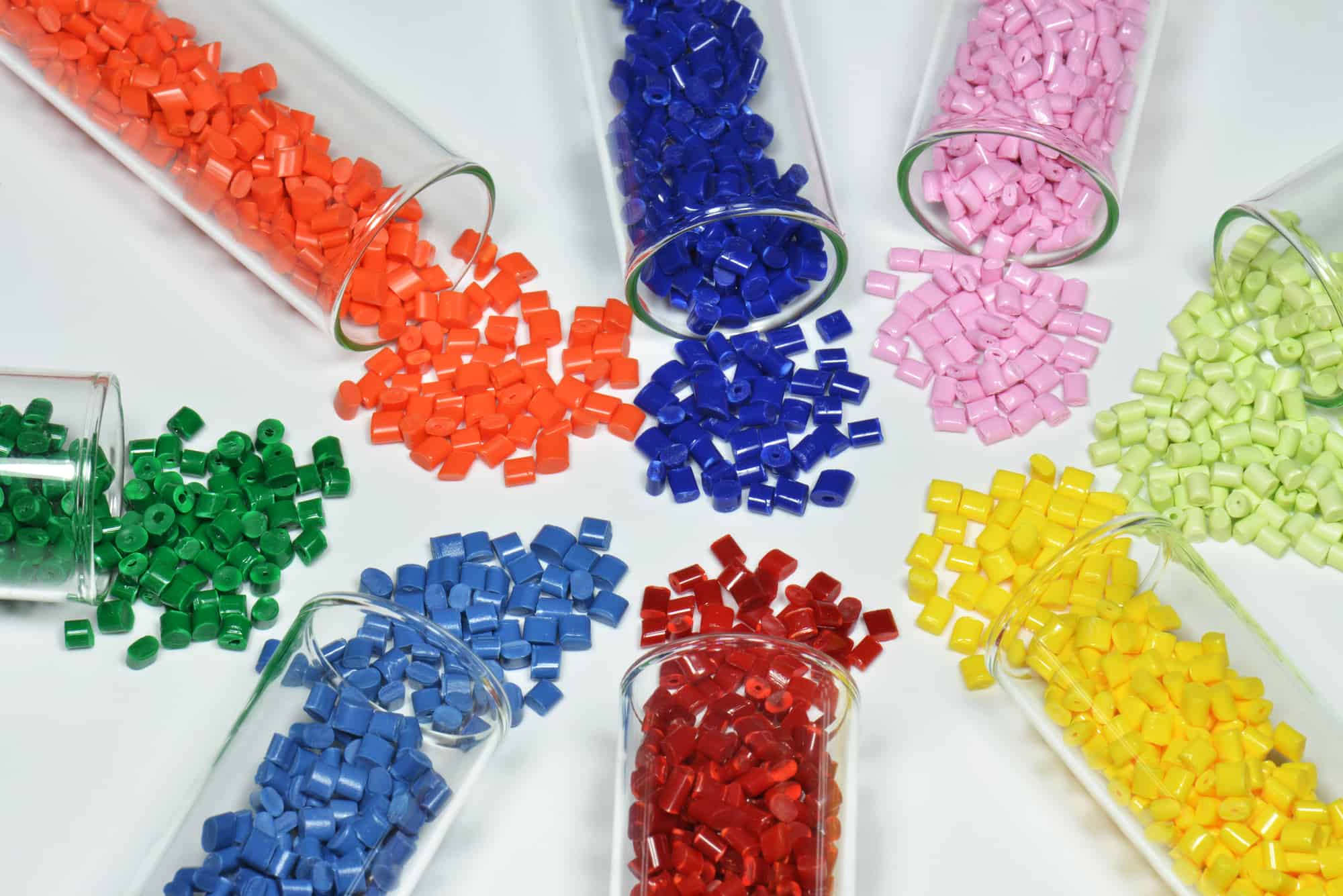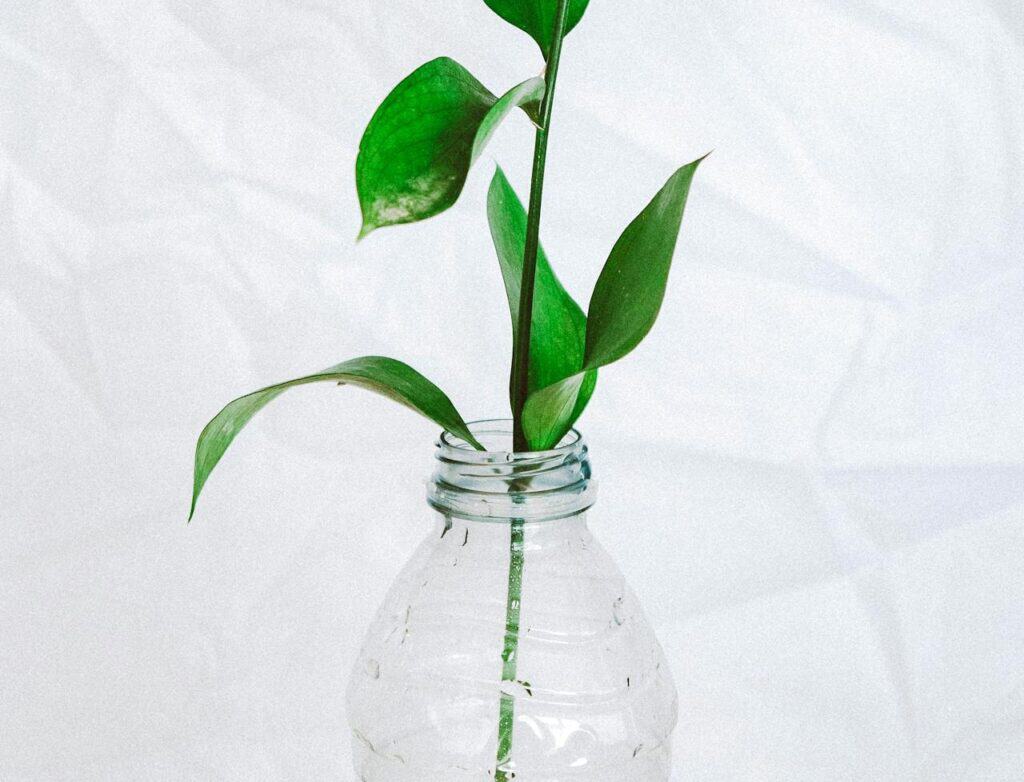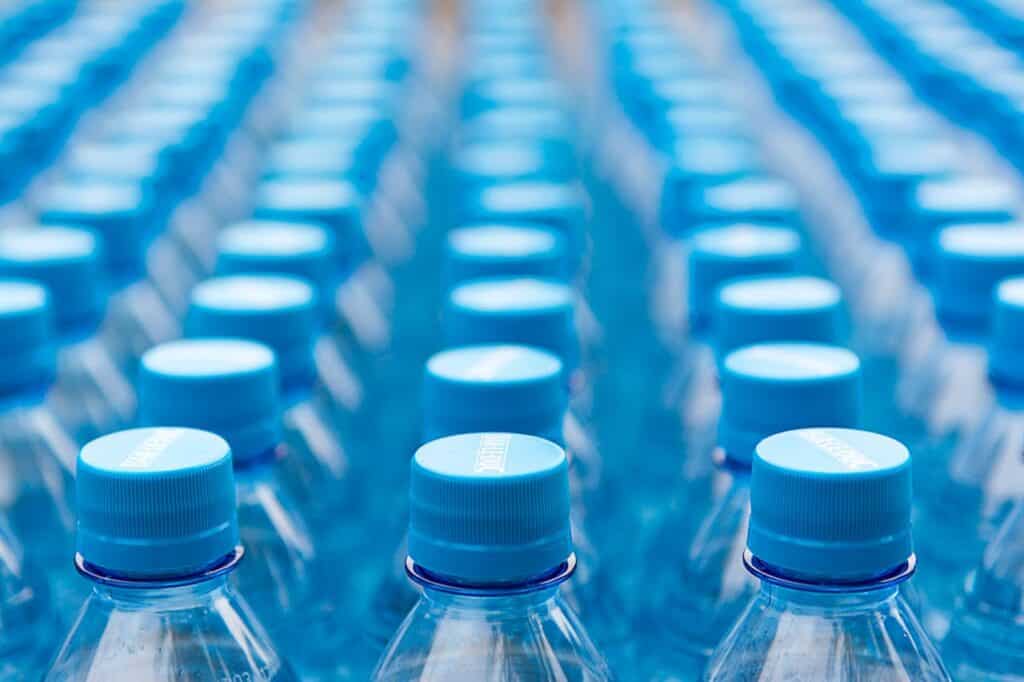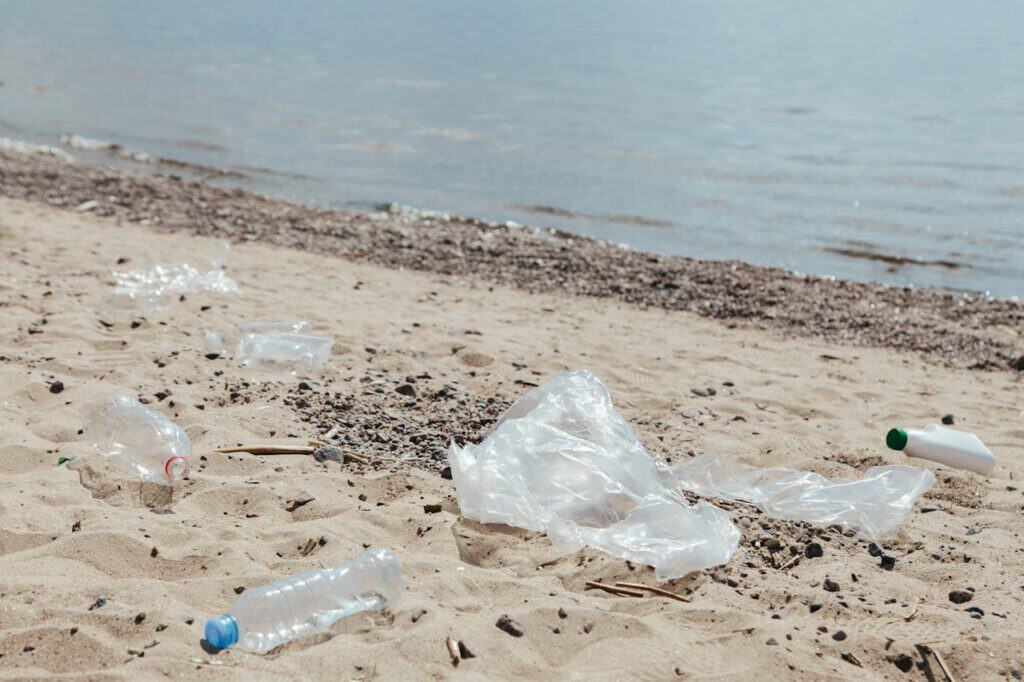In the UK, plastic recycling on an industrial scale is typically done through a mechanical process. Mechanical recycling involves sorting, cleaning, and shredding plastic waste into small pieces.
Once the shredding process has been completed, the waste plastic material is then usually granulated or flaked. The flakes can then be melted down and reused for the manufacturing of new products.
During the segregation and sorting process at the waste producing site, it is highly recommended that the waste plastic material is separated with minimal contamination.
The use of Plastic Expert’s industry-first “picking guides”, plus on-site training is provided to customers through our dedicated account managers.
In the event that some plastic material may contain a small element of contamination such dust, mud and paper labels, this is removed during the pre-granulation process to ensure the recycled pellet is desirable and suitable for remanufacturing.
What Is The Process of Recycling Plastics?
Polyethylene Terephthalate (PET or PETE)
PET plastic recycling is most commonly recycled using mechanical recycling. During the mechanical process, the material is sorted and washed. The sorted PET items are cleaned to remove impurities like dirt, glue, labels, food residues, and other contaminants. Cleaned PET items are then shredded into small flakes.
These are melted and passed through a filtration system to remove any remaining contaminants. They are then extruded, typically into the form of pellets, which can be used for manufacturing various products.
High-Density Polyethylene (HDPE)
HDPE waste products such as containers often have residues of the original contents which need to be thoroughly cleaned. The clean HDPE granules are then melted and passed through an extruder, where they’re transformed into a consistent shape, often pellets, suitable for remanufacturing.
Recycled HDPE pellets can be used to manufacture a wide range of products, including plastic lumber, outdoor furniture, drainage pipes, and even new HDPE bottles and containers.
Polyvinyl Chloride (PVC or Vinyl)
Recycling PVC is more challenging than some other plastics due to its chlorine content and additives. Nevertheless, there are established processes for its recycling.
Most commonly, PVC is used for guttering, downpipe and to manufacture uPVC doors and windows. These different types of waste PVC are recycled in slightly different ways. For example, uPVC window frames consist of materials including rubber and metal. That is why a shredding process and mechanical sorting is required before the PVC element can be recycled.
PVC guttering and piping is a little easier to recycle due to its single material status, however, the plastic is often a lower quality because it may have been previously recycled.
Recycled PVC can be used in various other applications such as labels, signage, garden hoses and of course, guttering, fascias and pipes.
Low-Density Polyethylene (LDPE)
LDPE typically involves mechanical recycling. The cleaned LDPE items are processed through industrial grinders or shredders to break them down into smaller flakes. The purified flakes are melted and extruded through a die to form a continuous shape, commonly pellets. These pellets are then cooled and cut to a suitable size. The resulting recycled LDPE pellets can be used as a raw material in manufacturing.
In most cases, there is a higher commercial value to natural (clear) LDPE pellets as they can be coloured more easily if required. For example, if the LDPE material is black it cannot be made into a clear product.
Recycled LDPE plastic, can be used to make packaging material, gardening items, carrier bags and agricultural plastics.
Polypropylene (PP)
Polypropylene (PP) waste items are shredded and then granulated, preparing them for further processing. After shredding, further refinement might be needed to ensure a clean stream of PP.
Processes such as air classification (to remove light contaminants) and float-sink tanks (to separate PP from heavier contaminants or different plastics) can be utilised. Air classifiers use a stream of air to separate light and heavy materials. When particles are introduced into the classifier, they are carried by the airstream.
Recycled PP pellets can be used in various applications. Common applications include automotive parts, containers, garden furniture, and more.
Polystyrene (PS)
Whilst polystyrene is commonly shortened to PS, there are a range of polystyrene materials including HIPS and EPS. HIPS stands for high impact polystyrene, a thermoplastic material used for products such as trays, flower pots and signs.
EPS on the other hand stands for expanded polystyrene, that is a foam produced from solid beads of polystyrene. This is commonly found in insulation materials.
Recycling polystyrene presents unique challenges due to its lightweight nature, bulkiness, and the presence of additives or residues. Given its bulky nature, EPS is often compacted to reduce its volume. Machines called densifiers apply heat and pressure to melt the EPS, reducing its volume significantly.
Once cleaned, PS items such as EPS are ground into smaller pieces or pellets. The PS pellets are then melted and extruded to form a consistent shape. Recycled PS can be used in various applications, such as producing new PS products, insulation materials, or as an additive in wood-plastic composites.
PMMA / Acrylic
PMMA scraps are cleaned to remove dirt, adhesives, or other contaminants. Cleaned PMMA materials are then granulated or shredded into smaller pieces. The PMMA granules are then either extruded or compression molded:
Extrusion: The PMMA flakes are melted and extruded through a die, typically to produce pellets. These pellets can then be used in manufacturing.
Compression Molding: The PMMA flakes can be placed in molds and heated until they fuse together, forming a solid shape.
Typical applications include manufacturing new acrylic sheets, making construction materials, or producing automotive parts. Various types of PMMA products can be recycled. At Plastic Expert, we specifically recycle signage and COVID safety screens.
What Are Recycled Plastics Used For?
Recycled plastics have breathed new life into what was once waste, transforming it into a wide array of products and materials. Their versatility showcases the potential of a circular economy, where materials are reused, reducing our reliance on virgin resources.
Below are a few examples of products created from recycled plastics.
From Bottles to Bottles: One of the most direct forms of recycling, many plastic bottles are turned back into new ones. This closed-loop system helps save resources and energy.
Building a Greener Future: Recycled plastics find their way into construction. From durable composite lumber for decks to insulation materials, plastics are helping to build homes and infrastructure that are both sustainable and resilient.
Sustainable Clothing: Discarded plastics are being spun into fibers, creating durable garments. Creating clothes from recycled plastics, especially from PET bottles, is an innovative approach to both waste reduction and sustainable fashion.
Everyday Items: From sturdy rubbish bins to kids’ toys and even car parts, recycled plastics have entered our daily lives in products we use without a second thought.
Checking the recycling symbol can also tell you the type of plastic your waste material is made from. Recycled material is desirable in re-manufacturing from an environmental and cost perspective. Plastic pellets are always in demand when oil prices are higher.
Who Uses Recycled Plastic?
Many organisations use recycled plastic due to sustainability efforts and legislation. The Government has targeted large corporations to use recycled pellets in a bid to reduce plastic pollution and save raw materials. As a business, using recycled plastics also increases consumer demand as people want to invest money in greener businesses. According to a survey from McKinsey & Co., 66% of all respondents and 75% of millennial respondents say that they consider sustainability when they make a purchase.
Due to packaging tax rules, you will need to pay Plastic Packaging Tax if you have manufactured or imported plastic packaging components which contain less than 30% recycled plastic. This has pushed manufacturers to use recycled plastics when creating products.
The Optimal Recycling Process for UK Businesses
1. Segregating and Sorting At The Waste Producing Site
The first part of the recycling process is to separate plastic materials, collecting all items made from the same material into various siloes. The recycling process relies on sorting recyclable plastics before they go through a shredding and granulating machine. Recyclers need to sort the plastic if they use the depolymerisation technique.
2. Waste Volume Reduction For Transportation
Plastic is a bulky material. What’s more, there are only a few recycling facilities around the country which can recycle plastic efficiently. The next step of the process, therefore, is designed to make transporting it from A to B easier. Recycling organisations realised a long time ago that the best way to do this was to compact plastic down into small bales so that they could load the waste efficiently.
3. Shipping To A Licenced Recycling Factory
The waste bales are then transported to a licenced recycling factory. Here, the materials can then enter the recycling process.
Most companies use a third-party waste disposal company who provides a collection service from their premises. Collection companies deal with all the environmental paperwork and compliance issues for you.
4. Plastics Are Recycled Into New Products
The materials then enter the recycling process. This involves quality control, shredding and cleaning the plastic, and then breaking it down into pellets, granules or flakes.
The method will depend on the specific type of plastic that is being recycled. These recycled materials are then sold to manufacturing companies for further repurposing.
The Recycling Process For Waste Management Facilities (Infographic)
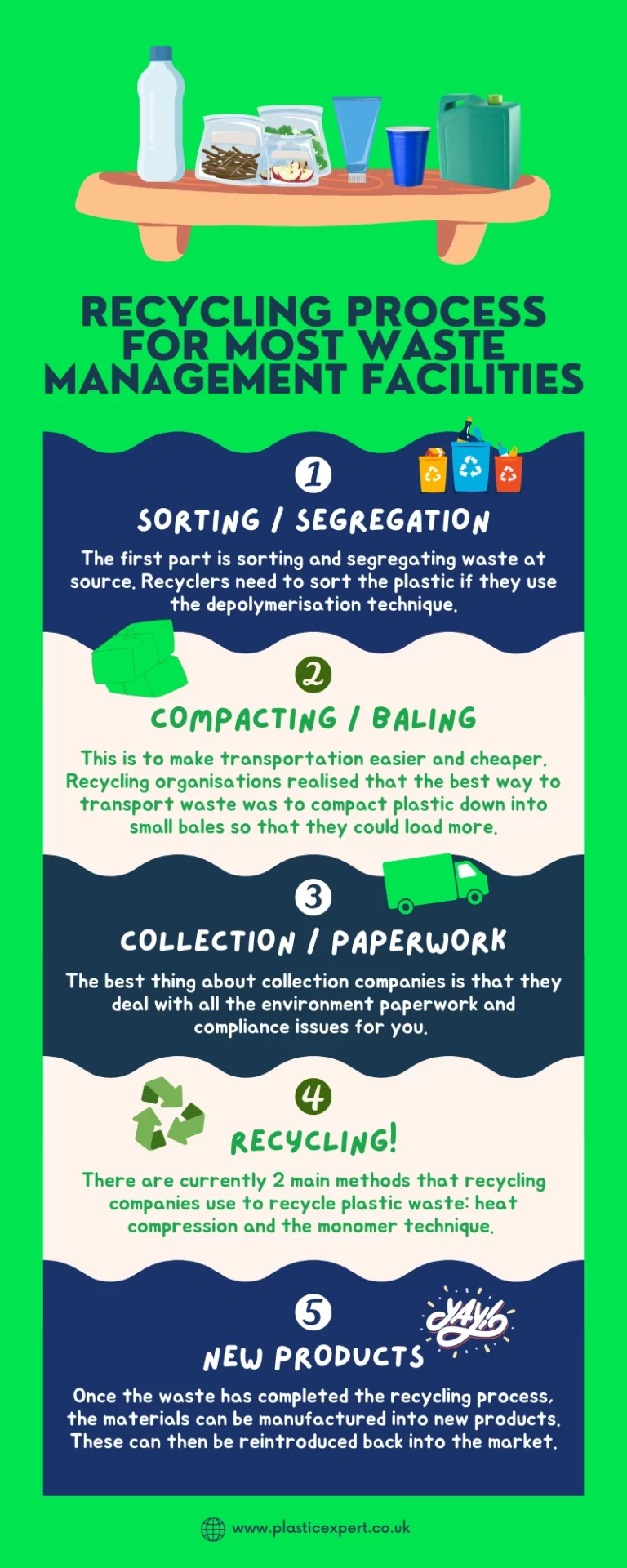
Book Your Plastic Recycling Collection
If you have plastic waste ready to recycle, get in touch with our team. We will organise a quick collection and have the plastic cleared and recycled into new products. Our team specialises in recycling most plastic materials, along with paper, cardboard and hazardous items.

